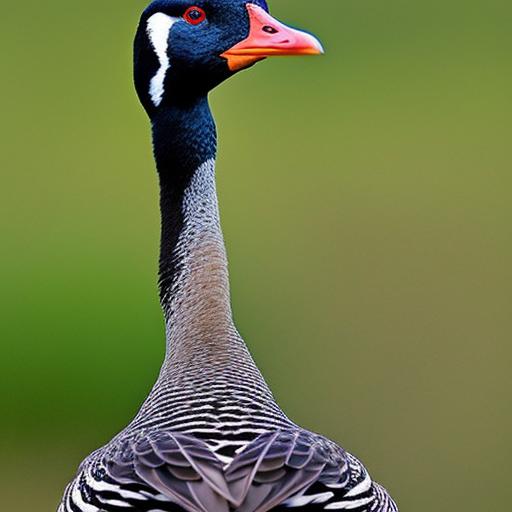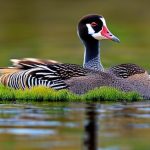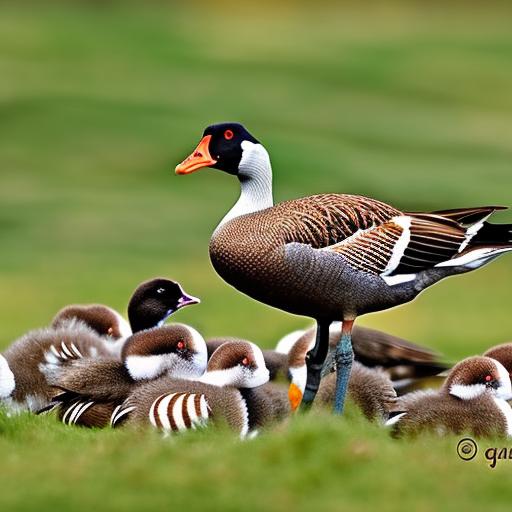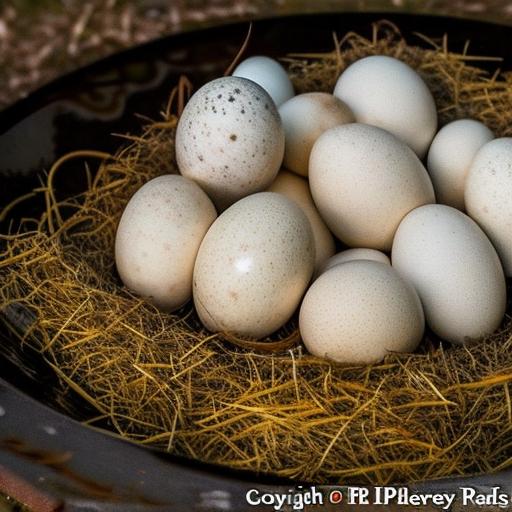Farm geese breeds are a group of domesticated geese that are specifically bred for agricultural purposes. These geese are raised on farms for various reasons, including meat production, egg production, and weed control. They are known for their hardiness, adaptability, and ability to thrive in different climates and environments. Farm geese have been an integral part of agriculture for centuries and continue to play a significant role in modern farming practices.
The importance of farm geese in agriculture cannot be overstated. They provide a sustainable source of meat and eggs, which are essential for food security. Additionally, farm geese play a crucial role in weed control by grazing on grasses and other vegetation, reducing the need for chemical herbicides. They also contribute to soil fertility through their droppings, which are rich in nutrients and act as natural fertilizers. Overall, farm geese breeds are valuable assets to farmers and contribute to the overall productivity and sustainability of agricultural systems.
Key Takeaways
- Farm geese breeds have been domesticated for centuries and are popular for their meat, eggs, and feathers.
- Popular breeds of farm geese include Toulouse, Embden, and Chinese geese.
- Farm geese breeds are characterized by their large size, hardiness, and adaptability to different climates.
- Farm geese were first domesticated in Asia and Europe and have since spread to other parts of the world.
- Breeding and rearing farm geese requires proper nutrition, disease management, and attention to breeding practices.
Popular Breeds of Farm Geese
There are several popular breeds of farm geese that are widely recognized for their unique characteristics and suitability for different farming purposes. Some of the most popular breeds include:
1. Toulouse Geese: Toulouse geese are large, heavy-bodied birds known for their excellent meat production. They have a calm and docile temperament, making them easy to handle and manage on the farm. Toulouse geese have a distinctive gray plumage and a prominent dewlap under their chin.
2. Embden Geese: Embden geese are one of the largest domesticated goose breeds. They have a pure white plumage and a graceful appearance. Embden geese are primarily raised for meat production but also produce a good number of eggs. They are known for their friendly nature and adaptability to different climates.
3. Chinese Geese: Chinese geese are medium-sized birds with a unique appearance. They have a slender body, long neck, and a prominent knob on their forehead. Chinese geese are primarily raised for meat production but also lay a fair number of eggs. They are known for their alert and active nature.
Characteristics of Farm Geese Breeds
Farm geese breeds exhibit a range of physical and behavioral characteristics that make them well-suited for agricultural purposes.
In terms of physical characteristics, farm geese breeds vary in size, color, and plumage. Some breeds, like the Toulouse and Embden geese, are large and heavy-bodied, while others, like the Chinese geese, are more slender. The plumage of farm geese can range from pure white to gray or even multi-colored. Additionally, farm geese have strong bills and webbed feet, which enable them to forage for food in water and on land.
Behaviorally, farm geese breeds are known for their social nature and strong flocking instincts. They are highly adaptable and can thrive in various environments, including wetlands, grasslands, and even urban areas. Farm geese are also excellent grazers and can efficiently convert grasses and other vegetation into meat and eggs. They have a natural instinct for weed control and can help farmers maintain healthy pastures without the use of chemical herbicides.
Domestication and History of Farm Geese Breeds
The domestication of farm geese dates back thousands of years. It is believed that the ancient Egyptians were among the first to domesticate geese for agricultural purposes. Geese were highly valued for their meat, eggs, feathers, and even their ability to act as guard animals due to their loud honking.
Throughout history, farm geese have played a significant role in various ancient civilizations. In ancient Rome, geese were considered sacred animals and were often kept in households as pets or for religious ceremonies. In medieval Europe, geese were commonly raised on farms for their meat and feathers, which were used for bedding and clothing.
The domestication of farm geese has continued to evolve over time, with breeders selectively breeding geese for specific traits such as meat production, egg production, or weed control. Today, farm geese breeds are bred and raised in farms all over the world, contributing to the agricultural industry and providing valuable resources for human consumption.
Geographical Distribution of Farm Geese Breeds
Farm geese breeds can be found in various regions around the world, each with its own unique characteristics and adaptations.
In Europe, breeds like the Toulouse and Embden geese are popular for their meat production. These breeds are well-suited to the colder climates of Northern Europe and have been bred for their ability to withstand harsh winters. In Eastern Europe, breeds like the Romanov geese are known for their high egg production and adaptability to different climates.
In Asia, Chinese geese are widely raised for their meat and eggs. They are well-adapted to the warmer climates of Southeast Asia and have been bred for their ability to thrive in humid conditions. In China, geese have been raised for thousands of years and are an important part of the country’s culinary traditions.
In North America, breeds like the Embden and Toulouse geese are popular for their meat production. They are well-suited to the temperate climates of the United States and Canada and have been bred for their ability to adapt to different environments.
Breeding and Rearing Farm Geese
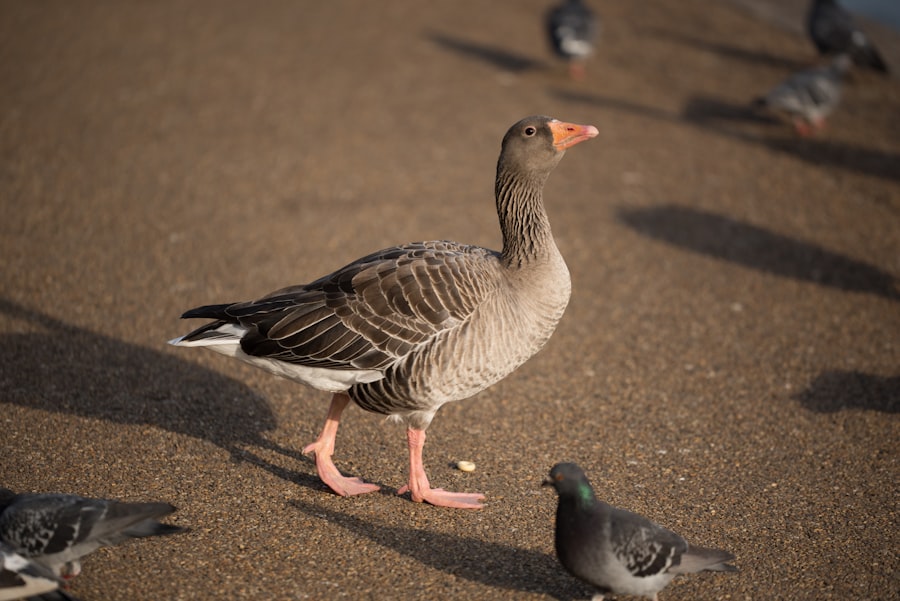
Proper breeding and rearing of farm geese is essential for maintaining healthy flocks and maximizing productivity.
When it comes to breeding farm geese, it is important to select breeding stock that exhibits desirable traits such as good meat or egg production, strong flocking instincts, and adaptability to local conditions. Breeding geese should be healthy, free from genetic defects, and have a good temperament. It is also important to maintain genetic diversity within the flock to prevent inbreeding and maintain overall flock health.
Rearing farm geese involves providing them with appropriate housing, feeding, and care. Geese should be provided with a secure and spacious enclosure that protects them from predators and extreme weather conditions. They should have access to clean water for drinking and bathing, as well as a balanced diet that includes a mix of grains, greens, and protein sources. Regular health checks and vaccinations are also important to prevent the spread of diseases and ensure the overall well-being of the flock.
Feeding and Nutrition of Farm Geese Breeds
Proper feeding and nutrition are crucial for the health and productivity of farm geese breeds.
Farm geese are primarily herbivores and have a natural instinct for grazing on grasses and other vegetation. They should be provided with access to fresh pasture or grazing areas where they can forage for food. In addition to grazing, farm geese should be fed a balanced diet that includes grains, greens, and protein sources such as insects or fish meal. It is important to provide geese with clean water for drinking and bathing, as well as access to grit or small stones to aid in digestion.
The nutritional needs of farm geese can vary depending on their age, breed, and purpose. Growing goslings require a higher protein content in their diet compared to adult geese. Breeding geese may require additional nutrients to support egg production. It is important to consult with a veterinarian or poultry nutritionist to ensure that farm geese are receiving the appropriate nutrients for their specific needs.
Health and Disease Management of Farm Geese
Like any livestock, farm geese are susceptible to various health issues and diseases. Proper management and preventive measures are essential for maintaining the health and well-being of the flock.
Common health issues that farm geese may face include respiratory infections, parasites, and nutritional deficiencies. Regular health checks and vaccinations can help prevent the spread of diseases and ensure early detection of any health issues. It is important to provide geese with a clean and hygienic environment, as well as access to fresh water and nutritious food.
Preventive measures such as proper biosecurity protocols, quarantine procedures for new birds, and regular cleaning and disinfection of housing and equipment can help minimize the risk of disease transmission. It is also important to practice good flock management, including proper stocking densities, adequate ventilation, and regular monitoring of flock behavior and overall health.
Economic Importance of Farm Geese Breeds
Farm geese breeds have significant economic importance in the agricultural industry.
The meat produced by farm geese is highly valued for its flavor and tenderness. It is often considered a delicacy in many cuisines around the world. The feathers of farm geese are used in various industries, including bedding, clothing, and fly tying for fishing. The eggs produced by farm geese are also consumed by humans and can be used in baking or cooking.
In addition to their direct economic value, farm geese also provide indirect economic benefits through their contributions to weed control and soil fertility. By grazing on grasses and other vegetation, geese help maintain healthy pastures without the need for chemical herbicides. Their droppings act as natural fertilizers, enriching the soil with nutrients and improving its fertility.
Future Prospects and Challenges in Farm Geese Breeding
The future prospects of farm geese breeding are promising, but there are also several challenges that breeders may face.
One of the main challenges in farm geese breeding is maintaining genetic diversity within the flocks. Inbreeding can lead to reduced fertility, increased susceptibility to diseases, and other genetic defects. Breeders need to carefully manage their breeding programs to ensure that genetic diversity is maintained and that the overall health and productivity of the flock are not compromised.
Another challenge in farm geese breeding is market demand. While there is a growing interest in locally sourced and sustainable food products, the market for farm geese meat and eggs may still be limited compared to other poultry products. Breeders need to identify and target niche markets that value the unique qualities of farm geese products, such as their flavor and nutritional value.
Despite these challenges, the future prospects of farm geese breeding are promising. As consumers become more conscious of the environmental and health impacts of industrial farming practices, there is a growing demand for sustainable and ethically raised food products. Farm geese breeds offer a viable alternative to conventional poultry farming, providing farmers with an opportunity to diversify their income streams and contribute to a more sustainable agricultural system.
Farm geese breeds play a vital role in agriculture, providing a sustainable source of meat, eggs, and other valuable resources. They are known for their hardiness, adaptability, and ability to thrive in different climates and environments. Farm geese have been domesticated for thousands of years and have played a significant role in ancient civilizations. Today, they continue to be bred and raised on farms all over the world, contributing to the overall productivity and sustainability of agricultural systems.
Proper breeding, rearing, feeding, and health management are essential for maintaining healthy flocks of farm geese. Breeders need to carefully select breeding stock, provide appropriate housing and nutrition, and implement preventive measures to minimize the risk of diseases. By doing so, they can maximize the productivity and profitability of their farm geese operations.
The economic importance of farm geese breeds cannot be overstated. They provide valuable resources such as meat, eggs, feathers, and natural fertilizers. Additionally, they contribute to weed control and soil fertility, reducing the need for chemical herbicides and synthetic fertilizers. As the demand for sustainable and ethically raised food products continues to grow, farm geese breeding offers a promising venture for farmers looking to diversify their income streams and contribute to a more sustainable agricultural system.
In conclusion, farm geese breeds are an integral part of agriculture, providing valuable resources and contributing to the overall productivity and sustainability of farming systems. They have a long history of domestication and continue to play a significant role in modern farming practices. By properly breeding, rearing, feeding, and managing the health of farm geese, breeders can maximize their productivity and profitability. As the demand for sustainable and ethically raised food products continues to grow, farm geese breeding offers a promising venture for farmers looking to diversify their income streams and contribute to a more sustainable agricultural system.
If you’re interested in learning more about farm geese breeds, you might also find this article on duck mating season fascinating. Understanding the breeding patterns and behaviors of ducks can provide valuable insights into the reproduction and care of other poultry species. Check out this informative piece on when duck mating season occurs to expand your knowledge on poultry breeding.
FAQs
What are farm geese breeds?
Farm geese breeds are domesticated geese that are raised for their meat, eggs, feathers, and down. There are many different breeds of farm geese, each with their own unique characteristics and uses.
What are some common farm geese breeds?
Some common farm geese breeds include the Toulouse, Embden, African, Chinese, and Roman breeds. Each breed has its own unique characteristics and is suited for different purposes.
What is the Toulouse breed?
The Toulouse breed is a large, heavy breed of domesticated goose that is primarily raised for meat production. They are known for their calm temperament and are often used as show birds.
What is the Embden breed?
The Embden breed is a large, white breed of domesticated goose that is primarily raised for meat production. They are known for their hardiness and adaptability to different climates.
What is the African breed?
The African breed is a medium-sized breed of domesticated goose that is primarily raised for meat production. They are known for their distinctive appearance, with a dark gray body and white head and neck.
What is the Chinese breed?
The Chinese breed is a small to medium-sized breed of domesticated goose that is primarily raised for meat production. They are known for their distinctive appearance, with a knob on their forehead and a short, curved beak.
What is the Roman breed?
The Roman breed is a small to medium-sized breed of domesticated goose that is primarily raised for meat production. They are known for their distinctive appearance, with a long, slender neck and a small, pointed beak.
Meet Walter, the feathered-friend fanatic of Florida! Nestled in the sunshine state, Walter struts through life with his feathered companions, clucking his way to happiness. With a coop that’s fancier than a five-star hotel, he’s the Don Juan of the chicken world. When he’s not teaching his hens to do the cha-cha, you’ll find him in a heated debate with his prized rooster, Sir Clucks-a-Lot. Walter’s poultry passion is no yolk; he’s the sunny-side-up guy you never knew you needed in your flock of friends!

